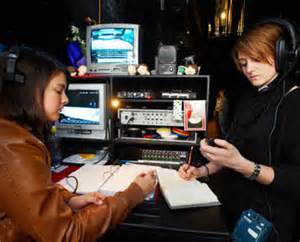

Too many times those who are just breaking into the theatre don’t understand how important it is to always act in a professional manner. In this and our next blog, we’re going to consider various aspects of the business as they relate to your being able to get a job, get rehired, and become a commodity with whom people want to work.
The fact is your next audition or interview is not often when you think it is. Yes, it’s true that when you go to a formal audition or interview for a show or company that you are, indeed, under close scrutiny. But, there are many other times in your professional life when you are auditioning or interviewing and you may not realize it.
Interaction with the Stage Manager

Professional interaction with a stage manager when auditioning, in rehearsal, or during a run is essential to your developing a solid reputation. Courteous, hard working professionals are always preferable to those who are difficult. Remember that although stage managers do not have the power to hire or fire someone, they work closely with everyone involved in the production and with the theatre company. If you are being unprofessional with the stage manager, you can bet that the producer will know about it, and it the result will be negative as far as your future with that theatre or company is concerned. Why is that the case? Because unprofessional behavior wastes time and money, and it is counterproductive to creating a good production.
On Time and Know Your Lines
Always be on time for any call. Actors, technicians, and creatives need to be ready to go when called. That means if you have a 9 a.m. call that you show up 15 minutes early and that you are ready to work at 9 a.m. Lateness, like bad behavior, wastes time and money, and will harm a production and your ability to secure future employment.
Disciplined, Reliable, and Cooperative

Theatre is a business and that means that like any business the theatre demands that those who work in it are disciplined, reliable, and cooperative. Too many people believe that just because they got the job that they can keep it. Anyone can be fired if they are not doing adequate work. If that does happen to you, do you think you have a chance of ever being rehired by that same company?
Think About This
Here are some quick tips to consider. Ask yourself, “What are my chances of being rehired if…?”
- I’m an actor and I don’t know my lines and/or blocking on time
- I’m a designer and I don’t meet my deadlines or I submit incomplete designs
- I’m a director and I don’t do my homework, I miss rehearsals, or am difficult
- I’m a technician and I do not pay attention to my duties or have inadequate skills
- I’m a stage manager and I’m unable to facilitate the scheduling of which I am in charge
- I yelled at, belittled, upset others; I’m making life difficult for others; I have a drinking or drug problem
This type of behavior and other types can result in you losing your job and never being asked back.
It’s a Small World
Finally, remember that it is a small world and people talk to one another. Directors talk to producers, producers talk to other producers, stage managers talk to everyone, etc. It doesn’t take much to develop a bad reputation that then begins to haunt you, as one professional will talk to another about their experiences with you.
Plus, those doing the hiring will call those places that you’ve worked at that are on your resume. These may or may not those you list as your references. Your job history in the theatre is an open book. In our second section concerning hidden interviews and auditions, we will look at 10 actions that will ensure you will never be hired again by a specific producer or theatre or that will scuttle an audition or interview.

 Random Item
Random Item